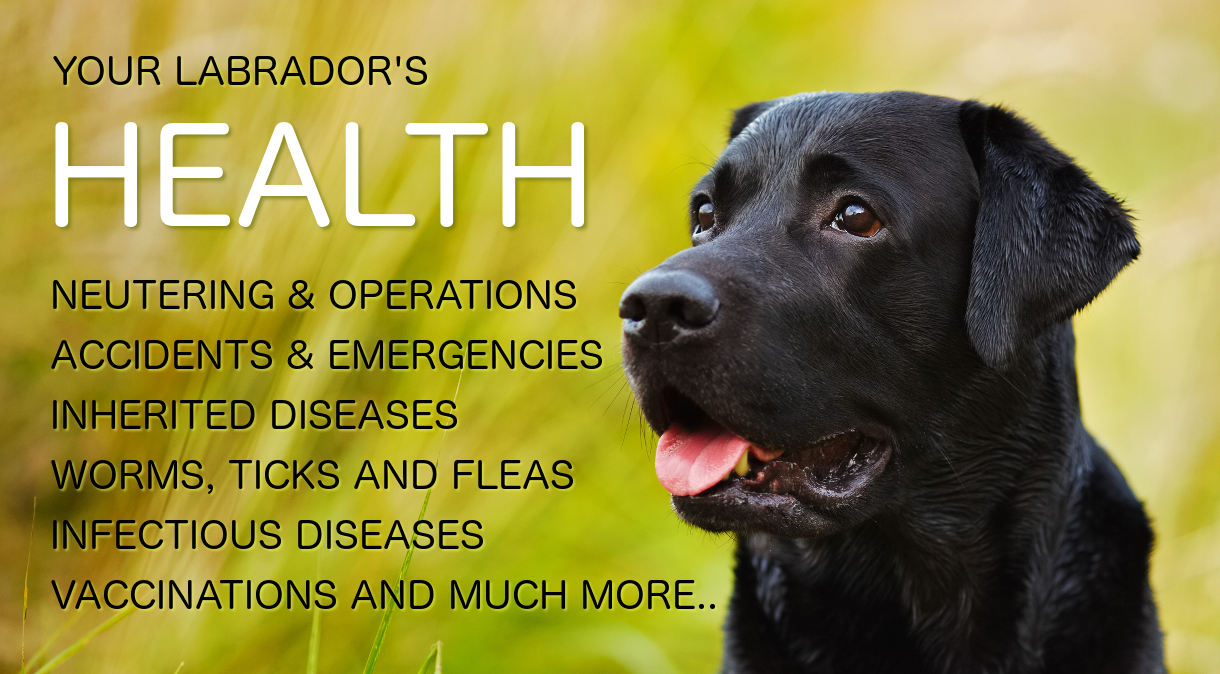
Keeping your Labrador healthy
We explore a range of health issues in labs, and we have gathered lots of information to help you keep your Lab in tip-top condition. In this section of the Labrador site you can find sections on:
- Veterinary Treatment: Vaccines, Costs & Insurance
- Inherited diseases and Illnesses
- Neutering
- Diet and exercise
- Parasites
- Breeding
- Emotional well-being, happiness & bonding
Check out our health category Here you’ll find a collection of all our articles on Labrador health articles displayed one one page. They cover a wide range of health topics. You can also find articles on Fears and Phobias, and on other behavioral problems in our Labrador Behavior section.
Are Labs Healthy Dogs?
In general the Labrador Retriever is a fairly healthy breed. Labs don’t suffer from major conformational defects, they are well proportioned with a good length of leg and muzzle.
There are some genetic issues in the breed that have arisen due to inbreeding. And some of those issues can be tested for. So its important when choosing a Lab puppy, that you go to a breeder with a good knowledge of those tests, and a willingness to make use of them!
What to do when your Labrador is sick
We get many questions on this website from people whose dogs are sick or injured. We are always so sorry to read about dogs that are unwell. People send in their dog’s symptoms and most often ask about
- Vomiting and tummy troubles
- Limping
- Hair loss / falling out
- Failure to grow/thrive
- Rashes
While we can provide information about different conditions that Labradors may suffer from, it isn’t possible for anyone, no matter how well qualified, to attempt to diagnose health problems over the internet. Usually, the best course of action is for you to visit or telephone your own veterinary surgeon. It is especially important to seek help without delay, when a very young puppy is sick.
When to call the vet
Quite a lot of the puppy questions people ask us, are about puppies that need to be examined by a qualified vet. But it can be difficult for new puppy owners to know exactly when to call the vet. And when to wait a while to see if the pup improves on his own For this reason, I am posting up some guidelines as to what is normal for an eight week old puppy, and what might suggest that you need to take your puppy to your local vet.
Normal for puppies
A healthy Labrador puppy sleeps deeply but is lively when awake. He smells lovely, has clean ears and eyes, and pees often (eg at hourly intervals or more frequently) during the day.

Puppies bite very hard (it hurts) and growl fiercely while playing. This is not aggression.
All the above is normal. The following is not normal
Not normal for puppies
- Call your vet if your puppy seems listless, won’t eat, has persistent diarrhoea, is sick more than once within 48 hours, or twice in a week.
- Call your vet if your puppy swallows anything you think may harm him, cries for no apparent reason or in an unusual way.
- Call your vet if your puppy’s breathing is noisy or laboured.
- Call your vet if he drags one of his limbs, is unsteady on his feet, or seems to be limping. Call your vet if your puppy has a discharge from any part of his body.
- Call your vet if your puppy cuts himself, falls badly, or just seems generally off colour.
If in doubt, call your vet!
Puppies under eight weeks old
Very young puppies need special care, and puppies under eight weeks old need to be with their brothers and sisters. We strongly recommend that you do not purchase a puppy that is less than eight weeks old. We cannot advise you on feeding underage puppies, you do need to get this information from your vet or from a very experienced dog breeder.
More information
There are lots of articles on puppy care in the puppy sections that are listed on the main puppy page. You’ll find this link on the menu bar at the top of every page on this site. We do try and answer as many of your questions as possible but will always give priority to topics that are not covered in the articles that are already on the website.
My vet isn’t helping
Sometimes people write in because they are not happy with their vet’s diagnosis or prescription. The answer is almost always to go back to your vet and talk to him about your concerns, or to get a second opinion.
Going back to your vet
Some vets, while brilliant with animals are not the greatest communicators with people. If your vet has not clearly explained his diagnosis (what is wrong with your dog) his prognosis (what he thinks will happen next) or his recommended treatment. Get him to spell it out for you. You are entitled to this information! In plain English.
It is very common to leave a vet’s office or surgery, get home with your dog, and think of a whole load of questions you wish you had asked. This is normal. We do it when we go to the doctor too.
Many people fail to make use of telephone consultations with their vet. You don’t need to go to your veterinarian’s office in order to speak to him. If you have questions to ask, or points that need clarifying, write them down and telephone him. If he isnt available ask him to phone you back. Many vets will do this free of charge provded you don’t make a constant habit of it.
Getting a second opinion
Even experts disagree sometimes, they are only human. And we can’t all get on really well with everyone we meet. I think it is important that we have a good relationship with out vets, and that we understand what is going on when they treat our pets.
If your vet is a poor communicator, you are concerned about the treatment he has prescribed for your dog, or you simply don’t get along, there is nothing wrong with getting another opinion. In fact, it is the right thing to do.
Many people are not aware, that in the UK it is also illegal for anyone other than a qualified veterinary surgeon to diagnose or even recommend treatment for, anyone else’s animals. Any health information given on this website should be used in conjunction with veterinary advice.
We are adding to our library all the time. Let us know if there are any other topics you would like us to cover. We love to hear from you!










What is the safest flea and tick medication for a 5 yr old female lab that has had a seizure?
Using NexGard.
Ma lab puppy is just 3months old since last 12hrs it isn’t eating much n is dull …wat treatment could be given
My nearly 6 year old labrador has been diagnosed with elbow dysplasia.Can anyone advise me on the best joint supplement to get and whether it is likely to help? He is very active at the moment and loves a walk and swim and is not limping at all.Thank you
My 5 year old male is constantly getting ingrown hairs between his toes on his front paws, my vets says this is common on bull dogs.
We are now trying soaking his paws in epsom salt. He another one so back to the vet again tomorrow. Anyone heard of this ? Or had similar problems.
Hi, I have an 11 year old female suffering with a bladder infection, also has a history of seizures. Is the antibiotic Cephacare safe to give to a dog that has seizures? As on your website you state Cephalexin should not be given to epileptic dogs. Earlier in the year she was given Noroclav antibiotic causing her to have 11 seizures in 2 days, prior to this she hadnt had a seizure for 4 months. I am frightened to give her the Cephacare in case she has the same reaction or worse, at her age. Can you please give me some advice.
Hi
I have a 7 year old black lab he has suddenly grown a really thick coat and not casting any fur even in the hot weather ? He also seems to have an increased appetite can you advise is this normal ?
My Lab is almost 9 years old. She is a very sweet & sensitive pup. She has Lymphoma Cancer. She was diagnosed w/it almost 2 years ago. We keep a very close eye on her. We plan trips surrounding her. If she can’t go, we don’t go. She is becoming more tired & is sleeping more than she used to. She does eat & drinks when she is thirsty. Her urine is yellow, which concerns me. She loves to play, when she plays. She usually will play hard for about 6 to 10 minutes & the she will sleep in her recliner or bed for 2 days. She prefers & has always preferred to be warm. She likes to be covered up w/her blankets fresh from the dryer. My husband & I want her to live the best life she can within our financial means. We get her blood work done every 6 months. We get her teeth cleaned yearly. We don’t know what to expect w/her Lymphoma Cancer. The Vet said every dog can react differently w/Cancer. We don’t know anyone who has had to deal w/dogs that have had Cancer. Is there anyone who has had a dog w/Cancer & what insight can you give us about what to expect.
Lebrador puppy no eating any food without pedigiri
My 7 year old lab has been onlevothyroxine for her thyroid for 3 years. She has gained a few pounds and am wondering what I have to do about her food. She gets 1 cup in the morning and 1 at night. A Carrot at night. 1 Tbs. of yogurt as a snack. During the day. She doesn’t like to fetch.. walks are sniffing everything.. was giving her a treat to clean teeth… wondering if that would of put the pounds on… would appreciate your input. Thank you
Hi my 11mth old Labrador has just been diagnosed with OCD in both rear ankles, I am devastated and would like some advice.
Thanks
opps I meant I was told mine should be 75 pounds.